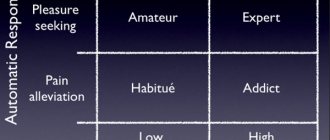Group behavior
This refers to the directed action of several people who are part of the same social group. Basically, the type of behavior of people is determined by the influence of certain processes directly related to the group itself.
The difference from other species is the consistency of the relationship between individuals, even if they are not in the same territory at the time of performing tasks.
Types of behavior
The following types of behavior are distinguished:
- Aggressive behavior is a specific form of personal behavior, characterized by a demonstration of superiority with the use of force in relation to another, and the desire to cause damage. The degree of intensity of aggression can vary from demonstrations of ill will, hostility, verbal aggression to physical aggression, violent acts;
- Deviating, deviant behavior is a system of actions and actions of an individual that contradicts the moral and legal norms accepted in society. The main forms of deviant behavior are crime and immoral, non-criminal behavior;
- Indirect behavior - actions directed not by impulses, wishes of the individual, but by rules, norms and requirements;
- Field behavior is the subject’s orientation towards situationally significant objects, in contrast to the orientation towards achieving a set goal, a set of reactions, impulsive responses to the stimuli of the surrounding reality;
- Sexual behavior is forms of interaction between individuals motivated by sexual need; an important component of personal, family and social life.
Finished works on a similar topic
- Course work Types of behavior 450 rub.
- Abstract Types of behavior 270 rub.
- Test work Types of behavior 200 rub.
Receive completed work or specialist advice on your educational project Find out the cost
Sex role behavior
This division is a reflection of the behavior of people of a particular gender. It depends on the area, traditions, orders and other determining factors. It is expressed in the fulfillment of basic social roles established due to the life processes of specific social groups.
These types of human behavior are characteristic of groups of individuals. Their manifestations are directly related to the goals of society and the functions performed by members of society.
Antisocial behavior
Of great interest to modern researchers is antisocial behavior, which is defined as the inability of an individual to establish strong social relationships, unwillingness to adhere to accepted norms, the rules of society, lack of loyalty to others, lack of desire to comply with one’s duties to them, lack of guilt for unseemly actions.
The main forms of manifestation of antisocial behavior are the following:
- avoidance of academic and professional activities;
- vagrancy, leaving home;
- consumption of alcohol, drugs, tobacco, etc.;
- antisocial selfish actions (theft, extortion, etc.);
- antisocial actions of a sexual nature (vandalism, aggression, fights, etc.);
- "telephone terrorism";
- suicidal behavior.
Suicidal behavior is one of the forms of manifestation of antisocial behavior, a complex phenomenon that arises under the influence of a combination of psychiatric, psychological, and social factors.
Too lazy to read?
Ask a question to the experts and get an answer within 15 minutes!
Ask a Question
Competitive Behavior
This type of behavioral reaction of an individual is expressed in the fact that he perceives people as potential or actual competitors. This look provokes him to fight or compete with them. The main point of this behavior is to win or gain an advantage. It is directly related to the A type of human behavior in an organization.
These are impatient, irritable, distrustful, hostile people. Opposite to it is behavioral line B, according to which the individual does not strive for competition and treats everyone around him kindly.
Types of behavior
There are many classifications of behavior. They distinguish between social and individual behavior, internal and external behavior, innate and acquired (and in it - creative), intentional and not, conscious and not, right and wrong. More details:
Social behavior
Social behavior is a person’s actions among people and regarding people (I and you, I and we). These are not just actions among people, but socially significant actions, something that is significant for others. “Your child ran away from class and cleaned up the bad grades in his diary!” - this is a significant circumstance, therefore such actions relate to social behavior.
Social behavior has many varieties: adequate and inappropriate behavior, conflicting and syntonic, correct and erroneous, deviant and delinquent... In everyday life, it is important for people to distinguish between intentional (intentional) behavior (carried out on purpose) and unintentional (carried out by chance, without a head). If a person is not used to thinking and does not think about what he is doing, this mitigates his guilt, but does not relieve him of responsibility. You will get a bad grade for bad behavior at school, both for pranks and for accidentally breaking a window as a result. If a person has a behavioral reaction, his responsibility is not removed, but is reduced. “It wasn’t me who started calling names, he started it first!”
Another important distinction is between conscious behavior (consciously controlled by a person) and unconscious behavior. Unconscious behavior is the most common, and it is also the source of most human problems. We usually don’t notice our unconscious behavior, but those around us notice immediately and react to it - unfortunately, often just as unconsciously.
Note that if a husband and wife begin to take revenge on each other unconsciously, this is still their behavior. They may not notice this, deny it and argue, but if some facts are recorded by adequate people around them, most likely those around them are right.
A role is a socially defined model of behavior. By demanding the fulfillment of certain social roles, presenting certain expectations, some people control others. Cm.
Although all human behavior is social, in some context it is appropriate to talk about individual behavior: such behavior occurs in the “Self and objects” paradigm. It can be appropriate or not, effective or not (erroneous, inadequate), but it cannot be conflicting or deviant.
Innate and learned behavior
Learned behavior: the girl copies adults.
Children, like a sponge, absorb the quarrels of their elders - learned behavior.
On another basis, behavior is innate (instincts and learned in the first hours after birth), acquired (formed as a result of teaching, training and upbringing) and creative (created by the person himself). Innate behavior is behavior that is genetically programmed or learned in the first hours after birth (imprinting). Learned behavior is behavior that arises as a result of learning.
It should be noted that contrasting innate behavior with learned behavior is not entirely correct. Why? Upon closer examination, it turns out that a large number of learned behaviors are the result of the maturation of innate readiness, where the external factor of learning played the role of initiator. It is more correct to contrast innate behavior with acquired behavior.
Behavior that was learned in the first hours of life (a type of imprinting) is considered innate.
Acquired behavior is formed as a result of learning, training and education. Part of acquired behavior is acquired programs - a set of actions and reactions that were invested in a person by society during his life. This is language and vocabulary, concepts and norms, all the knowledge and skills that have been put into it.
Part of acquired behavior is learned behavior: a pattern of behavior learned early on from parents and other loved ones. Learned behavior is a behavioral pattern that arose early on from parents and other loved ones.
For example, arachnophobia.
Most of the habitual emotions appear to be learned behaviors. The opposite of learned behavior is creative, independently born (found, made) behavior.
Other forms of social behavior
One of the special forms of social behavior is the desire for success. It directly affects not only the performance of a person, but also his entire life. In the last century, this type of behavior was clearly expressed in society. Avoiding failure is also an important behavioral manifestation.
It is expressed in a person’s desire not to be worse than those around him and to strive with all his might to reach their level or even become better. Some people strive to communicate with a large number of people, others, on the contrary, avoid society. There are manifestations of the desire for power, attempts to retain it, and the opposite type - humility. You can also highlight confidence and suspiciousness. The first type is manifested in belief in one’s strength and achievement of success. The second is expressed in defeat due to doubts and fears.
Standards of behavior between spouses
To build a stable house, you need to lay a solid foundation and build the walls brick by brick. So in family relationships - love is the foundation, moral standards of behavior are the building blocks.
Married life is not only about joyful moments, it is also about disappointment, irritation and resentment. In order to get through all the unpleasant moments with dignity and maintain the integrity of the marriage, you need to follow a few simple rules:
- treat your partner as an equal; - appreciate his personal qualities; — support in any endeavors and do not ridicule failures; — discuss important points and make decisions together; - do not resort to insults and insults; - do not allow yourself to be assaulted; - be faithful to your spouse.
Behavior as a moral category
Behavior is a set of human actions that an individual performs over a long period of time under given conditions. These are all actions, not individual ones. Regardless of whether actions are performed consciously or unintentionally, they are subject to moral evaluation. It is worth noting that behavior can reflect both the actions of one person and an entire team. In this case, both personal characteristics and the specifics of interpersonal relationships influence. Through his behavior, a person reflects his attitude towards society, towards specific people, and towards the objects around him.
The concept of rules of behavior, etiquette
Etiquette is a set of norms and rules that regulate a person’s relationships with others. This is an integral part of public culture (culture of behavior). It is expressed in a complex system of relationships between people. This includes concepts such as:
- polite, courteous and protective treatment of the fair sex;
- a sense of respect and deep respect for the older generation;
- correct forms of everyday communication with others;
- norms and rules of dialogue;
- being at the dinner table;
- dealing with guests;
- fulfillment of the requirements for a person’s clothing (dress code).
All these laws of decency embody general ideas about human dignity, simple requirements of convenience and ease in human relationships. In general, the rules of conduct coincide with the general requirements of politeness. However, there are also strictly established ethical standards that are immutable.
- Respectful treatment of students to teachers. Maintaining subordination in relation of subordinates to their management.
- Standards of behavior in public places, during seminars and conferences.
Golden rule of behavior
In addition to the fact that we all know the generally accepted rules of behavior, there is a golden rule. It originated in ancient times, when the first essential requirements for human morality were formed. Its essence is to treat others in the way you would like to see this attitude towards yourself. Similar ideas were found in such ancient works as the teachings of Confucius, the Bible, Homer's Iliad, and so on. It is worth noting that this is one of the few beliefs that has survived to this day almost unchanged and has not lost its relevance. The positive moral significance of the golden rule is determined by the fact that it practically orients the individual towards the development of an important element in the mechanism of moral behavior - the ability to put oneself in the place of others and emotionally experience their condition. In modern morality, the golden rule of behavior is an elementary universal prerequisite for relationships between people, expressing a continuity with the moral experience of the past.










